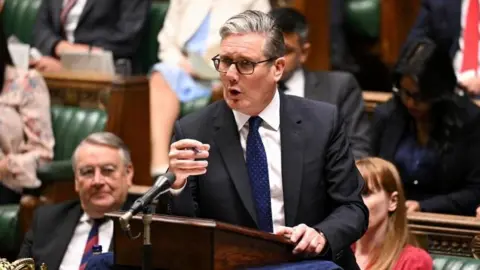**PM’s Benefit Cuts U-turn Leaves Backbenchers Feeling Bruised**
In a political landscape characterized by rapid changes and intense scrutiny, Prime Minister Keir Starmer recently faced a significant backlash from his own party regarding proposed welfare reforms. The policy adjustments have ignited strong feelings among backbench Labour MPs, some of whom felt compelled to express their discontent vocally. This reaction indicates a fracture not just in the party’s alignment but also in the relationship between the Prime Minister and his parliamentary colleagues.
The uproar came to a head following Starmer’s initial plans to implement stricter welfare benefit criteria, which sparked outrage among Labour’s backbenchers. They raised concerns that the proposed changes would adversely affect vulnerable populations. Notably, sentiment among the MPs ranged from disappointment to outright anger. “What an absolute bloody shambles!” one frustrated Labour MP remarked on the situation, reflecting a broader sense of dissatisfaction growing within the party ranks.
On June 27, 2025, within the context of ongoing debates and constraints regarding the welfare structure, Starmer announced concessions in response to the turmoil. Importantly, he stated that the stricter criteria would be applied only to new claimants. While some MPs acknowledged these concessions as a positive step towards soothing fears about impacts on existing claimants, many were still unconvinced that the proposed measures adequately addressed the root issues.
Debbie Abrahams, a prominent member of the Work and Pensions Select Committee, publicly supported these concessions while simultaneously urging further scrutiny. She expressed: “The concessions are a good start; they are very good concessions that will protect existing claimants.” Yet she cautioned against complacency regarding new claimants, illustrating a nuanced position within the party where support for Starmer’s leadership is being met with apprehension.
This split opinion among Labour MPs highlights the ongoing struggle within the party to find a unified stance on welfare reform. The group known as Disability Labour continues to rally against the new plans, emphasizing the necessity for a unified opposition to protect the interests of those most compromised by potential cuts. Many MPs caution that the internal discord could have severe consequences for the party’s stability as they prepare for future electoral challenges.
Moreover, the impasse has seemingly fractured the rapport between the Prime Minister and his backbenchers. The frustrations of Labour MPs have found expression in candid assessments of their leader. One backbencher lamented the government’s tendency to regard them as “an inconvenience,” viewing occasional meetings with Downing Street as insufficient avenues for genuine dialogue. This underscores a growing sentiment that the Prime Minister and his Chief of Staff, Morgan McSweeney, may not be adequately attuned to the concerns and needs of less senior party members.
Compounding the challenge for Starmer is the continuous pressure from within his party regarding financial management under the stewardship of Chancellor Rachel Reeves. Senior government figures maintain that fiscal responsibility remains a cornerstone of Labour’s identity, asserting that Reeves’ rules are part of a strategy aimed at reinforcing this perception. Nonetheless, whispers of discontent suggest that some MPs believe only a new chancellor might resolve ongoing tensions surrounding budgetary constraints and welfare funding.
As the Labour Party approaches the first anniversary of Starmer’s term in office following a general election, the Prime Minister seems at a crossroads. His recent reflections in an interview with biographer Tom Baldwin further complicate his position, especially where he has walked back harsh rhetoric previously used to describe immigration’s impact. While attempting to mend fences with his party’s left, Starmer’s remarks have instead drawn criticism, showing that even those who initially support him feel alienated.
In conclusion, the fallout from the U-turn on benefit cuts not only emphasizes the current rifts in the Labour Party but also raises broader questions about the guiding principles of Starmer’s leadership. As tensions within the party continue, the challenge for Starmer remains: to navigate these turbulent waters while re-establishing strong connections with his fellow MPs, ensuring a stable footing in the year ahead. The coming days will be crucial for assessing how he reconciles these internal conflicts and affirms Labour’s collective identity moving forward.











